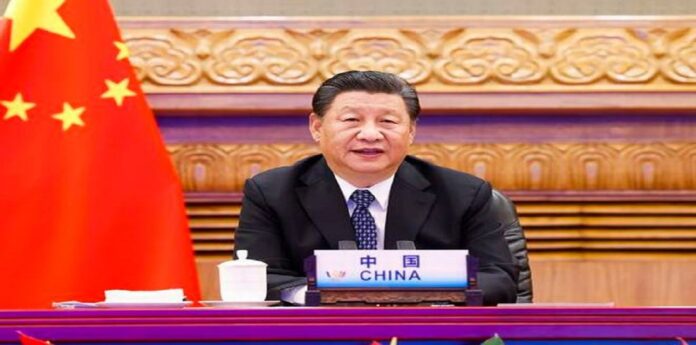The months till the 20th Party Congress scheduled for late next year is fraught with risk for China and its neighbors. It is a particularly crucial year for Chinese President Xi Jinping, who is trying to secure a third term, unprecedented since Mao Zedong, at the 20th Party Congress. At the same time, there are signs of enhanced political activity, albeit subterranean, which suggest that Xi Jinping’s opponents are also active, thereby raising the stakes.
By Jayadeva Ranade
A fairly clear indication is the attention being paid by China’s leadership to the powerful security apparatus, known among Party cadres as “the knife handle” (daobazi, 刀把子). After Politburo Standing Committee member and Security Czar Zhou Yongkang’s ouster and imprisonment immediately prior to the 18th Party Congress in November 2012, Xi Jinping downgraded the position of Chairman of the Political and Legal Affairs Commission (PLAC), which oversees the entire security apparatus, to that of a Politburo member reporting directly to him thereby taking direct charge of the security establishment. By 2013-14 he had replaced much of the senior leadership of the central security establishment with his loyalists. He appears, however, not to have looked at the senior to middle rungs of the security establishment and there are indications that sections within the establishment are not entirely loyal to him. Examples are the numerous instances between 2017-18 and again between 2020 and early 2021when posts critical, or opposing, Xi Jinping and the CCP were permitted to stay for long periods on Chinese social media websites before being deleted. There have also been reports at regular intervals of dismissals of senior security personnel. Xi Jinping has now begun addressing this since late last year.
After the 26th ‘collective study session’ of the Politburo chaired by Chinese President Xi Jinping on December 11, 2020, ten measures were identified as necessary to tighten security. Among these, political security was prioritised as a top-level concern and references to “political security” and “political stability” in China’s official media increased visibly thereafter. This session was held amidst growing concern that the increasing tensions with the United States could spark more political turmoil inside China. The following month the Party’s leading theoretical fortnightly journal Qiu Shi began calling for “protecting” Xi Jinping as the “core” of the Party. The People’s Liberation Army (PLA) had already started exhorting cadres to “protect” Xi Jinping as the “core” of the Party from 2019.
Earlier, in July 2020, Xi Jinping loyalist Chen Yixin had announced a three-month (July-October) pilot programme for the entire security apparatus to prepare for the beginning of “a self-restoration with the blade inward and bone scraping to cure the poison”! Chen Yixin was handpicked by Xi Jinping as Secretary General of the powerful PLAC.
On June 10, 2021, Chen Yixin announced that in the initial phase itself 75,084 security personnel had been disciplined, 1760 were placed in ‘liuzhi’ (detention), and 1012 sent for prosecution. As indicated by Guo Shengkun while addressing a meeting of the Political and Legal Education and Rectification Leading Group on June 16, the campaign is far from over.
The CCP’s powerful anti-corruption watchdog body, the Central Discipline Inspection Commission (CDIC), recently indicated that the rectification is not yet over. A notification on its official website on August 7, 2021, stated that over 90 “leading cadres” of the Political and Legal system at the department level or above were investigated and dealt with in the first half of the year.
State Councillor, Secretary of the Party Committee of the Ministry of Public Security and Minister of Public Security Zhao Kezhi subsequently confirmed on October 16, that the rectification drive is continuing. He disclosed that the bureau and 8 bureau-level units under the Ministry have “promoted investigations and corrections” on the work of “eliminating the effects of poisoning”. The term “poisoning” is a reference to the existence of ideas contrary to those of the CCP or opposing factions or groups. A month ago the campaign was expanded to include all of China’s 1,355 counties. There is no doubt that more personnel will be weeded out.
While senior cadres who have been in the system for many years could have been expected to forge loyalties to previous General Secretaries of the CCP, the charges leading to the dismissal of Fu Zhenghua and Sun Lijun were surprising. Both were promoted by Xi Jinping. Though Fu Zhenghua never served under Xi Jinping, both were considered by Beijing-based Chinese observers to be among his supporters. Punitive action was taken against them within days of each other. Sun Lijun was dismissed as Vice Minister of Public Security on September 29, and on October 2, the CDIC’s State Supervision Commission announced that 66-year old Fu Zhenghua, former Justice Minister and at the time Deputy Director of the Social and Legal Affairs Committee of the CPPCC National Committee, had been placed under disciplinary review and supervision and was under investigation on suspicion of “serious violations of discipline and law”. Fu Zhenghua and Sun Lijun had worked together in the Ministry of Public Security from 2013-2018. Their dismissal appears to have had repercussions in the public security apparatus with top leaders holding a series of meetings warning cadres to oppose factions and stressing the need for loyalty.
Fu Zhenghua’s case is particularly interesting. It could have far reaching implications and signal the start of more senior security cadres, affiliated to Jiang Zemin or other opposing factions, being weeded out or pulled out of retirement and punished. Fu Zhenghua is the highest ranking security official, after Politburo Standing Committee member and Security Czar Zhou Yongkang, to have been dismissed from the CCP and be put on trial. His last assignment before retirement was as Minister of Justice. Born in Hebei province, Fu Zhenghua rose through the ranks of the public security hierarchy of Beijing Municipality and in 2010, was promoted to the Beijing Municipal Public Security Bureau and appointed Secretary of the Party Committee. The same year he was made a member of the Standing Committee of the Beijing Municipal Party Committee and Deputy Secretary of the Municipal Committee of Political and Legal Affairs. From January 2015 to February 2018, Fu Zhenghua served as Deputy Minister and Deputy Secretary of the Ministry of Public Security, and was concurrently a member of the Central Political and Legal Committee and Director of the Central “610” Office. He served as Deputy Secretary of the Party Leadership Group of the Ministry of Justice and Minister of Justice from March 2018 to April 2020. From May 2020 till his dismissal he was Deputy Director of the Social and Legal Committee of the CPPCC National Committee. A report says that Fu Zhenghua was brought in to the Beijing Public Security Bureau by Liu Qi, a former secretary of the Beijing Municipal Party Committee and member of Jiang Zemin’s faction.
According to Epoch times (October 2), five years ago Wuhan billionaire businessman Xu Chongyang had accused Fu Zhenghua of ‘mobilising 4000 political and legal personnel against Xi Jinping’. During the Chinese New Year in 2019, Xu Chongyang again accused Fu Zhenghua, in an 18,000-character complaint. He alleged that Fu Zhenghua has close ties to the sacked security ‘tigers’ Zhou Yongkang and Meng Jianzhu and also that he has close ties to Guo Shengkun, currently Politburo member and Secretary of the CCP CC’s Central Political and Legal Commission!
The case of Sun Lijun, who till his dismissal and expulsion from the Party was a security cadre on the fast-track, is of particular interest. He was formally arrested on November 4. Sun Lijun was the deputy head of a high-level team sent by Beijing to Wuhan, Hubei province in February 2020 to help contain the Covid-19 outbreak. The charges levelled against him were more serious than the usual instances of corruption and having mistresses and clearly suggested that Sun Lijun was actively working against Xi Jinping.
On September 30, China’s official media reported that 52-year old Sun Lijun, a former Chinese Vice Minister of the Public Security Bureau, has been sacked and expelled from the CCP and will face trial for “serious violation of discipline rules and law”. The charges against Sun Lijun publicised by Xinhua were very serious and unusual. Xinhua quoted the CDIC as saying that “[Sun] has never had any real faith or ideals … He harboured hugely inflated political ambitions, and was of extremely bad political quality. To achieve his political objectives … [he] resorted to whatever means … forming gangs and factions, seizing control of key [security] departments, seriously undermining the unity of the party, and causing extreme danger to the political security [of the party].” It added that Sun Lijun “had secretly possessed a large amount of confidential materials, and engaged in superstitious activities for a long time” [For a long period of time, Sun] lived a decadent life, accepting huge amounts of bribes and expensive gifts … [He] is a man with no morals, trading power for money and sex.” More seriously the report disclosed that Sun Lijun had been under investigation for 17 months from April last year, had resisted the investigation and “did not explain [his] problems truthfully” to the investigators. The CDIC said Sun Lijun’s “case has been transferred to prosecutors who will arrange for a trial in accordance with the law.” Interestingly, Sun Lijun was secretary to Meng Jianzhu, a former Politburo member and Minister of Public Security (2012-2017) with strong patron-client ties to former CCP General Secretary Jiang Zemin. He is also reported to be a close ally of Politburo Standing Committee member and Vice Premier Han Zheng, who heads the central leading group on Hong Kong and Macau affairs.
The charges levelled against Sun Lijun also reveal that while he was actively working against Xi Jinping, there are other factions or groups in the security apparatus which are also opposed to Xi Jinping. These could include pro-Bo Xilai groups. The series of meetings being held in the security apparatus following the dismissals of Fu Zhenghua and Sun Lijun appear to confirm this and suggest that news of involvement of other senior security cadres may soon follow. Of special interest is the meeting convened by Guo Shengkun, Politburo member and Secretary of the CCP CC’s Central Political and Legal Committee. Of particular interest is the language he used. Xinhua (October 8) reported that Guo Shengkun chaired the second ‘national political and legal team education and rectification work promotion meeting’ on October 8 where he emphasised that he “firmly supported the Party Central Committee’s decision to thoroughly implement the Party Central Committee’s deployment and increase efforts to promote the education and rectification of political and legal teams”. Guo Shengkun also expressed “firm support” for the Party Central Committee’s decision to deal with Sun Lijun’s serious violations of discipline and law and the decision to conduct disciplinary review and supervision and investigation of Fu Zhenghua’s suspected serious violations of discipline and law. He added “We must resolutely and thoroughly eliminate the poisonous influence, insist on real hard work, and resolutely clean up in place”. State Councilor and Minister of Public Security Zhao Kezhi, the Chief Justice and President of the Supreme People’s Court of China Zhou Qiang and Procurator-General, Supreme People’s Procuratorate Zhang Jun were present at the meeting.
Later, on October 19, the Legal Daily reported that an enlarged meeting of the Party Committee of the Ministry of Public Security was held on October 16 to convey the “spirit” of the Ministry of Public Security’s third work report. State Councilor, Secretary of the Party Committee of the Ministry of Public Security and Minister of Public Security Zhao Kezhi presided over this meeting. The Legal Daily disclosed that “the bureau and 8 bureau-level units under the Ministry” were carrying out “investigation, correction, rectification” and “the work of eliminating the effects of poisoning”. Zhao Kezhi stressed the need to “thoroughly study and implement the important instructions of General Secretary Xi Jinping and the spirit of the CPC Central Committee decisions” and to enhance and continue “to deepen political understanding” and “eliminate the pernicious influence of Sun Lijun” and “gangs”. It said “the education and rectification of the second batch of political and legal teams across the country entered the stage of investigation, correction and reform”.
Underscoring the importance of the case, the Legal Daily report included at least five references to “Sun Lijun’s political gangs” and their serious violation of law, elimination of “the pernicious influence of political gangs as a top priority” and the serious violation of law by the Sun Lijun political gangs. The meeting asserted: “We must focus on political loyalty, persist in learning and education throughout, thoroughly study and implement the spirit of the important precepts of General Secretary Xi Jinping’s important speech, and earnestly build the foundation of faith, supplement the spirit of the spirit, and stabilize the ideological rudder, from the ideological, political, and organizational. In the above and work style, thoroughly eliminate the poisonous influence of Sun Lijun’s political gang, and strive to build a loyal and vigilant soul”. It insisted “We must continue to deepen the rectification of stubborn diseases”. Wang Xiaohong, Deputy Secretary of the Party Committee and Executive Vice Minister of the Ministry of Public Security and a close associate and loyalist of Xi Jinping attended the meeting along with members of the Party Committee of the Ministry of Public Security. The main “responsible” officials of various bureau-level units under the Ministry, “relevant responsible” officials of the CDIC and Supervision Group and the State Immigration Administration attended the meeting as non-voting delegates.
The charges levelled against Sun Lijun and the inordinately long time of 17 months taken to carry out the investigations make clear that a number of elements opposed to Xi Jinping are present in China’s security apparatus. Sun Lijun’s expulsion from the Party and arrest and the repeated references to “political gangs” appear to confirm that the authorities have identified other “disloyal” elements and placed them under investigation. Xi Jinping loyalists are now carrying out a thorough rectification of the public security apparatus. More persons with suspect loyalties will be weeded out or punished. The involvement of Xi Jinping loyalists in the rectification campaign is indicated by the presence of Zhao Kezhi and Wang Xiaohong, both Xi Jinping loyalists, in the meetings. There are also other signs suggesting a heating of political activity and of Xi Jinping retaliating against opponents.
This article first appeared in www.vifindia.org and it belongs to them.








